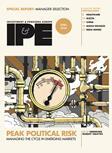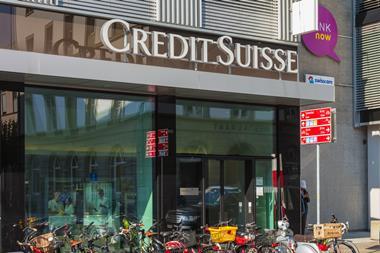Switzlerland’s Ethos Foundation, the pension fund-backed corporate governance and ESG fund specialist, has warned UBS of integration risks following its takeover of Credit Suisse. It is also demanding job protection and disclosure of investments that are damaging to the climate.
Ethos also said the combined banking entity now faces concentration risks in the Swiss market. In real estate, UBS and Credit Suisse provide 50% of mortgages in Geneva alone, and an even greater share across Switzerland. This represents a systemic risk, Ethos chief executive officer Vincent Kaufmann said this morning at UBS’s annual general meeting (AGM).
Pension funds have already warned that the deal will have a negative impact on banking sector competition in Switzerland, as well as on clients.
Kaufmann also underlined the “social consequences” of a takeover with possible job cuts.
Ethos is also expecting a socially responsible integration approach by UBS given the support of the government for the acquisition and the low price of the takeover, including protection for jobs globally.
“We know that UBS has not actively sought the takeover,” Kaufmann said. “The price of the takeover of [CHF]3bn represents 7% of the equity capital of Credit Suisse, per 31 December 2022.”
Ethos is proposing a spin-off of Credit Suisse Switzerland that could lead to a stock dividend to existing shareholders, including pension funds.
Moreover, according to the Ethos CEO, UBS should make efforts to improve and strengthen its sustainability strategy following pressure from shareholders at last year’s AGM, taking into account carbon emissions and investment disclosure, to create transparency and set precise targets for investments to limit global warming.
Last year UBS had sustainability-focused assets totalling $268bn, including $178bn in asset management and $10bn in the global wealth management division, according to the bank’s latest sustainability report.
Ethos has also demanded that AGMs are held both virtually and in person in the future, a hybrid model that gives freedom of choice to shareholders.
Kaufmann noted that today’s vote “is on the possibility to hold virtual AGMs only under extraordinary circumstances”, but following the UBS/Credit Suisse takeover, it shows how important it is to hold AGMs with people physically present.
Replying to the words of Ethos’ CEO, UBS chair Colm Kelleher described the bank’s approach towards governance and compensation as solid and in line with performance, adding that UBS is committed to improving sustainability reporting efforts.
Asset and wealth management plans
The merger of UBS and Credit Suisse creates a new entity with total invested assets of $5trn, and additionally one of the largest asset managers in Europe with more than $1.5trn in total assets.
Last year, UBS reported asset inflows worth $60bn for its global wealth management business and $25bn for its asset management division.
The bank has the ambition to grow specifically in wealth and asset management, a business it knows well and which has “relatively low risks,” Kelleher said in his introductory speech opening the AGM today.
The combination of UBS and Credit Suisse, the first such merger of two global systemically important banks, “is not in any way easy” and brings with it significant execution risk, he added.
“You are in a wonderful position to generate growth, with synergies in wealth management, but there are also challenges [ahead], particularly in Switzerland,” Kaufmann said, adding that the new CEO Sergio Ermotti, who is effectively taking over the helm at the bank today after the dismissal of Ralph Hamers, has proved his skills for almost a decade in leading the bank.
A day after Credit Suisse’s AGM
UBS’s AGM comes just a day after the one held at Credit Suisse, with investors angry at management for failing to avoid the near collapse of the bank.
“Ultimately, there were only two options: deal or bankruptcy, Axel Lehmann, the board of directors chair, said in its speech, adding that huge outflows of client funds last October were a major setback.
Despite the anger, Credit Suisse shareholders voted yesterday to re-elect Lehmann as chair until the closing of the merger with UBS, and also approved the bank’s climate strategy.
A representative for ShareAction said that Credit Suisse’s climate strategy “remains inadequate” to avert the consequence of climate change.
“The bank continues to have no real restrictions for the finance that it provides to fracking companies […] and that matters because fracking companies are significantly exposed to transition risks, often accused of causing environmental and social harm,” the representative of ShareAction said, demanding a more ambitious strategy from the merged UBS/Credit Suisse.
The latest digital edition of IPE’s magazine is now available

















No comments yet